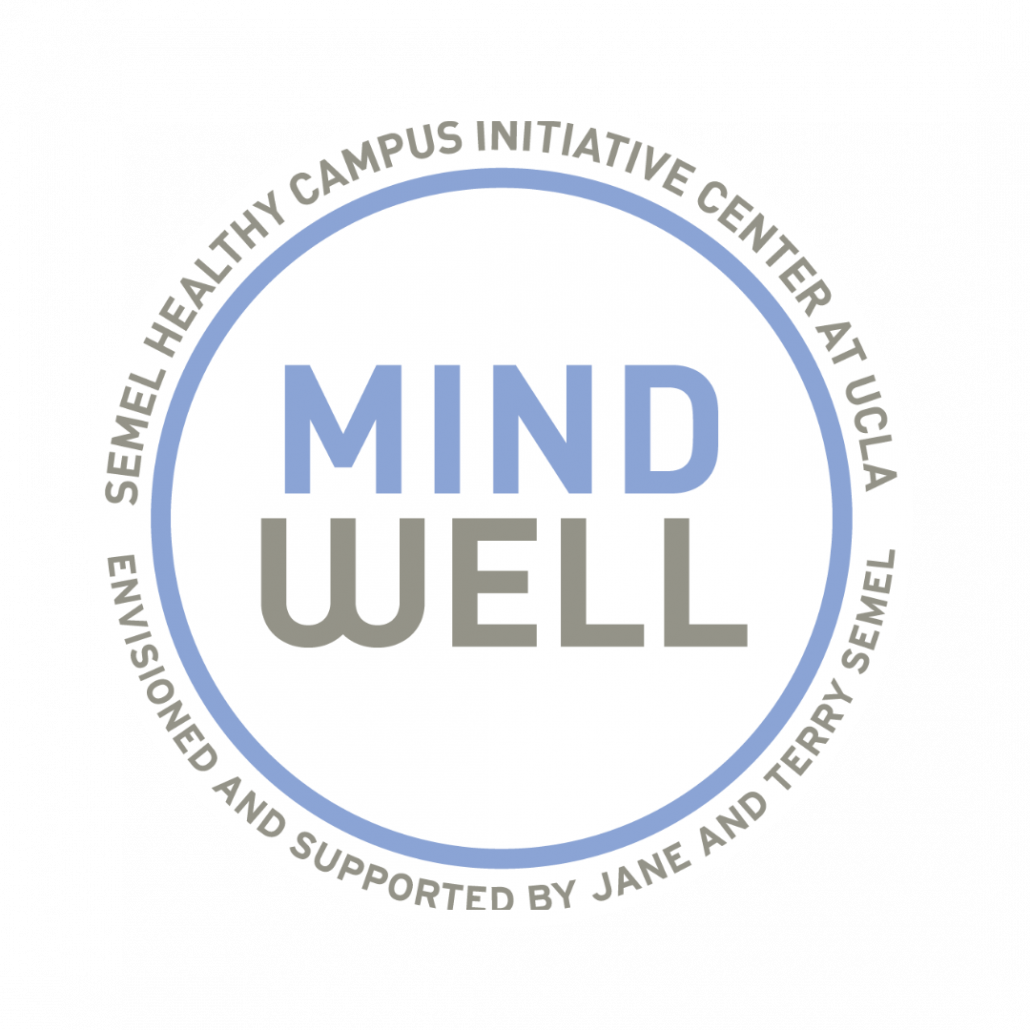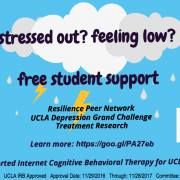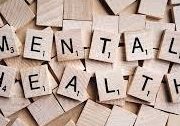Interview with a Certified Resilience Peer
Upon reading the title above, many questions may come to mind: What is a Resilience Peer? What do they do? Why are they important? By the end of this interview, I hope to help answer all of those questions.
A Resilience Peer is a UCLA student (undergraduate or graduate) that is a part of the Resilience Peer Network (RPN), a group that offers peer-to-peer counseling and support outside of a clinical setting. Participants in RPN undergo internet-delivered Cognitive Behavioral Therapy, which is very effective for managing mental health, especially mild to moderate Depression and Anxiety which are the main focus of RPN. Trained Resilience Peers offer individual or group therapy sessions to students who have screened into the program, under the supervision of licensed professionals.
One goal of RPN is to expand the availability of effective care to UCLA students who face challenges accessing guidance at existing mental health services. Recently, RPN teamed up with UCLA’s Depression Grand Challenge, the biggest Depression study in history; the Grand Challenge aims to reach and collect information on 100K individuals from around the world to better understand the origins of Depression, as well as develop new treatments to combat it. The challenge, in collaboration with faculty members in numerous departments at UCLA, desires to cut the burden of Depression in half by 2050 and eliminate it by the end of the century. UCLA, with its diverse population of students, leading expertise in many fields, and large connection of networks throughout the world, is using its resources to find a solution that millions will benefit from. If you want a quick overview of the Depression Grand Challenge and to learn of its many other goals, watch this YouTube video that covers it all.
The Interviewee
Now that we have some background information about RPN and what it does for mental health, let’s get to know a bit about the girl with all of the details, our backstage pass to RPN, our interviewee, Mandy Mekhail. She is a fourth year undergraduate student with a passion for Psychology and Disability Studies. She’s been an ASK Peer Counselor, New Student Advisor, and a GRIT Coach during her time at UCLA, but, most importantly, she’s been an advocate for mental health through it all! If you’d like to know a bit more about her awesomeness, she learned how to play, and in fact beat, her first video game before she was four years old. For all of the reasons above, she is clearly qualified to assist us as we delve into the world of RPN.
The Interview
Q: When did you decide to join RPN?
A: I first joined RPN last year when I was serving as Events Director of Active Minds, a committee within the UCLA Student Wellness Commission (SWC) that is dedicated to changing the conversation surrounding mental health.
Q: How has joining RPN helped or influenced you?
A: I consider myself a stanch mental health advocate and this opportunity has allowed me to come across many different populations of people. These experiences have encouraged me to approach anyone I meet with kindness and cultural humility. My goal is to listen to understand, not listen to respond.
Q: Why do you think bringing access to mental health support is important for students to know about?
A: There is no denying that students here are busy. RPN and internet-based cognitive therapy provides students with much more flexibility in seeking treatment. It’s arrival signals the importance that mental health has, not only in our school, but in our society.
Q: How has RPN and the Depression Grand Challenge helped erase some of the stigmas surrounding mental health?
A: RPN does a wonderful job of challenging stigma within our student body by normalizing the presence of depression and anxiety by emphasizing that there are other students, just like us, who also struggle. In that respect, I would argue that RPN removes some of the isolation that might go hand in hand with both a student’s busy schedule, and a decreased focus of self-care.
Q: What would you tell someone looking to get involved with RPN?
A: I would tell someone looking to join RPN to think about what the program could provide for them, but also what they could provide for the program and the people within it. As a certified resilience peer, we have the opportunity to facilitate a shared space of empathy and trust. The things we do have a profound impact on others, whether they realise it or not. With all that being said, I would recommend that the person think about their strengths and weaknesses, because we all have areas to grow in, as well as areas in which we uniquely flourish.
We all have mental health, and it’s important that we do all that we can to help maintain it, for ourselves and for all of those around us. If you are a strong advocate for mental health and feel as though the Resilience Peer Network is for you, contact Dr. Elizabeth Gong-Guy at egongguy@saonet.ucla.edu and provide information concerning your degree program, year, and a bit about why you are interested in joining the program. If you would like to receive treatment from RPN, visit https://goo.gl/PA27eb for more information and to participate in the iCBT Student Study screening, which will determine your eligibility. Follow #BlueForHope online and on social media to discover more people joining to the Depression Grand Challenge to greater our understanding of a mental illness that is the number one source of misery in the world, and that affects so many people around us.
Aubrey Freitas is an undergraduate student at UCLA double majoring in English Literature and Psychology with a minor in Italian. She is a blogger for the UCLA Healthy Campus Initiative in the Mind Well section, which focuses on the importance of mindfulness and mental health. Aubrey is the founder of the organization Warm Hearts to Warm Hands, which teaches the skill of knitting to people of the community in return for their donation of an article of clothing they create with the skill, to be given to local homeless shelters.


